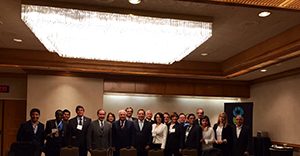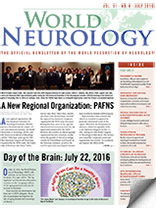By Marco T. Medina, MD, MPhil, FAAN, and Gustavo C. Román, MD, DrHC, FAAN

WFN President Raad Shakir, MD, (seventh from left), WFN Regional Director for Latin America Marco T. Medina, MD, MPhil, FAAN, (eighth from left), and Latin American WFN representatives gather during the Pan-American Federation of the Neurological Societies (PAFNS) meeting at the World Congress of Neurology Nov. 5, 2015, in Santiago, Chile, where the PAFNS legal status as a nonprofit organization under Chilean Law received approval.
A new regional organization, the Pan-American Federation of Neurological Societies (PAFNS), has been founded with the support of 20 Latin American countries, the World Federation of Neurology (WFN), and the American Academy of Neurology (AAN).1 Fifty-three years ago, the first Pan-American Congress of Neurology organized by the WFN, under the leadership of Professor Julio Oscar Trelles, met in Lima, Peru.2 Since then, neurologists from Latin America have attended the regional Pan-American Congresses organized by the WFN every four years. During that time, most of the regional educational and research activities for the region were promoted by the WFN.1-4 However, the need for an official regional organization became clear, mainly due to the growth of clinical neurology outside the United States and Canada on the American continent, as well as the need for up-to-date neurological information provided in Spanish and Portuguese.
Representatives from several Latin American countries recognized the particular educational needs of the region. This led to the Declaration of Morocco, which was signed by WFN Latin American delegates on Nov. 15, 2011, during the 20th World Congress of Neurology in Marrakech. The declaration stated that a regional continental organization was needed: “to coordinate and support the efforts of the member societies towards improvement of neurological services for the peoples of the American continent, as well as to optimize neurological care, education and research, and to promote public health initiatives to increase awareness of the importance of brain health.”
A commission formed by representatives from Chile, Brazil, and the Dominican Republic implemented the bylaws required for the creation of the PAFNS. On March 5, 2012, delegates attending the 13th Pan-American Congress of Neurology in La Paz, Bolivia, endorsed the declaration.4 On March 20, 2013, all Latin American delegates attending the 65th Annual Meeting of the AAN in San Diego, California, formally approved the PAFNS constitution.
The following countries approved and signed the constitution as founding and active ordinary members: Argentina, Brazil, Bolivia, Chile, Colombia, Costa Rica, Cuba, Dominican Republic, Ecuador, El Salvador, Guatemala, Honduras, Mexico, Nicaragua, Panama, Paraguay, Peru, Puerto Rico, Uruguay, and Venezuela. The Ibero-American Stroke Society, Commission on Latin American Affairs of the International League Against Epilepsy, and the World Sleep Society have requested to be associate members.
The enthusiastic regional support from all the Latin American member societies of the WFN; steady leadership of Gustavo C. Román, chairman of the WFN Latin America initiative, and Marco T. Medina, WFN regional director for Latin America1,4; and the support of Dr. Briseida Feliciano, Dr. Ana Robles, Professor Renato Verdugo, and others were critical for the foundation of the PAFNS. Two presidents of the WFN provided strong patronage to the project, Professor Vladimir Hachinski and Professor Raad Shakir. Enthusiastic support for this initiative was received from Professor Timothy Pedley, then president of the AAN, and Professor Morris Freedman, Canadian representative to the WFN.
On Nov. 5, 2015, during the XII World Congress of Neurology in Santiago, Chile, the legal status of the PAFNS as a nonprofit organization under Chilean law was signed, having as witnesses Professors Shakir, Medina, Román, Verdugo, and Sergio Castillo, as well as numerous Chilean and Latin American neurologists.
Legal counsel for elaboration of the PAFNS bylaws and establishment of the non-for-profit tax status was made possible thanks to grants provided by the WFN and the AAN.
During the upcoming Pan-American Congress of Neurology in Cancun, Mexico, at the end of 2016, the Council of Delegates will elect the new PAFNS Board of Directors. The PAFNS will be the preeminent neurological association of the Americas, working toward maximizing the neurological health of the people in all countries in the American continent through education and awareness of the importance of early care of brain diseases and dissemination of advances in neuroscience and the goal of optimizing neurological patient care. The PAFNS’ vision is to reach the highest level of neurological health in all the countries of the American continent. The creation of the PAFNS represents a major step for the improvement of regional neurological care, education, and research.
References
- M.T. Medina, G.C. Román. The Pan-American Federation of Neurological Societies (PAFNS): A New Regional Organization, J. Neurol. Sci. 366 (2016) 195-196.
- Johan A. Aarli (Ed.), The History of the World Federation of Neurology: The First 50 Years of the WFN, first ed. Oxford University Press, Oxford, 2014.
- M.T. Medina, T. Munsat, Neurology Education in Latin America and the World Federation of Neurology, J. Neurol. Sci. 298 (2010) 17-20.
- T. Munsat, J. Aarli, M. Medina, G. Birbeck, A. Weiss, International issues: Educational Programs of the World Federation of Neurology, Neurology 72 (2009) e46-e49.
- V. Hachinski, President’s Column: The Formation of the Latin America Federation of Neurological Societies, World Neurol. 27 (3) (2012)
